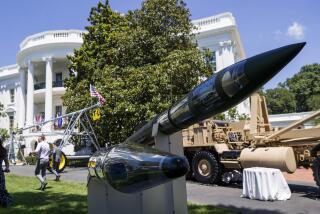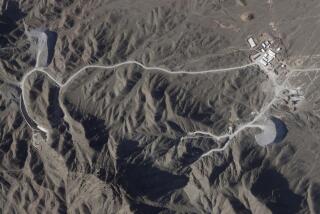U.S. Finds Iraq Has Germ War Plant
- Share via
WASHINGTON — The Reagan Administration has determined that Iraq--which reportedly used chemical weapons with devastating effect in its war against Iran--is now completing construction of a plant to produce even more fearsome biological weapons, U.S. sources confirmed Tuesday.
The Administration has quietly expressed its “concern and displeasure” to the Baghdad government, the sources said.
U.S. officials long have considered Iraq one of about 10 nations it suspects of developing germ warfare capabilities, but evidence of the plant’s existence was only recently confirmed.
“We are clearly concerned about this development,” one Administration source said. “We strongly condemn the development of biological weapons.”
The United States has not publicly lodged an official protest, perhaps to avoid embarrassing the strategically located Middle East nation, whose relations with the United States have improved in the last few years. The United States may also be reluctant to criticize Iraq openly for fear of driving it out of the moderate Arab camp where it has been since 1984.
Although Iraq’s ability to manufacture deadly biological toxins is believed to be growing, it still is not as advanced as Israel’s and Syria’s, a State Department source said.
The disclosure comes only weeks after the Reagan Administration revealed that Libya was constructing a chemical weapons facility, raising fears that such exotic weapons might be used against Israel or by terrorist groups aligned with radical Mideast states. The State Department source said that Libya also is believed to be developing a biological weapons capability.
Biological weapons are living organisms that cause diseases lethal to humans, such as cholera and typhoid fever, or animal diseases, such as anthrax. They can be dispersed into the air or water.
It could not be determined immediately where the Iraqi plant is located. However, ABC News reported that it is believed to be in Salman Pak, a city just south of Baghdad.
The Associated Press also reported Tuesday that Israeli officials and U.S. military experts have concluded that Iraq is “on the verge” of manufacturing biological weapons.
Iraqi Ambassador Abdul Amir Anbari denied that such a plant exists and called the disclosures a “deliberate campaign of disinformation.” Iraq, however, responded with similar denials five years ago after the United Nations accused the country of developing chemical weapons. Iraq later used mustard gas and other chemical weapons during its war with Iran and against Kurdish insurgents inside the nation.
More Potent
Biological weapons are considered more potent than the chemical weapons that Iraq is believed to have used to kill about 5,000 Kurds near the Iranian border. However, U.S. sources said that problems with delivery methods and hazards to friendly forces make biological weapons more difficult to use.
An obstacle to their effective use is that they are “hard to control and hard to deliver,” an Administration official said.
“At this stage, Mideast states can handle chemical warfare much more effectively” than biological combat, the source said. He said it is not known whether Iraq has the capability to use biological weapons.
Another Administration source said that it “may be several years” before Iraq has a biological weapons system that is usable in combat.
Iraq’s ability to launch modified Soviet-made Scud-B missiles up to 600 miles, proved during its war with Iran, heightens concerns that it might combine biological weapons systems with its improved missile threat.
Germ weapons are banned under the 1972 Biological Weapons Convention, which has been signed by 126 nations. The United States stopped producing germ warfare agents in 1969 and has since destroyed all its stockpiles.
The development of a biological warfare facility in Iraq is particularly alarming to U.S. officials because Iraq has shown its willingness to violate the international agreement banning use of chemical weapons.
The United States has frequently cited several Third World nations’ research on biological weapons as a reason to continue plans to construct a $5.4-million biological weapons test facility at Dugway Proving Grounds in Utah, about 70 miles southwest of Salt Lake City. The facility would use deadly and infectious germ agents in tests of protective gear and decontamination procedures.
U.S. officials have said that 10 nations, several of them in the Middle East, are suspected of efforts to achieve a biological warfare capability. The list of nations is classified, but sources have confirmed that Iraq is on it.
Only isolated incidents of biological warfare have been recorded throughout history. In one case during World War I, however, the Germans infected Romanian cavalry horses with the disease glanders.
More to Read
Sign up for Essential California
The most important California stories and recommendations in your inbox every morning.
You may occasionally receive promotional content from the Los Angeles Times.










